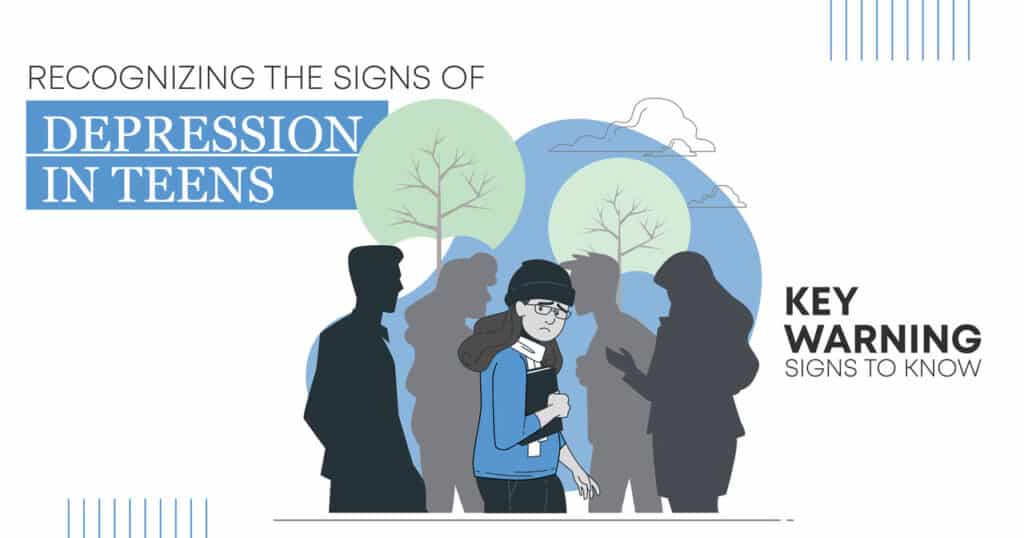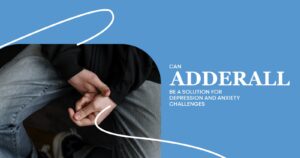Teenagers are most associated with mood swings and being obstinate, but for some teens, this kind of attitude may be an indication of even more profound issues. Teen depression is a significant and common condition where many teenagers are influenced. The recognition of the first indications that signal depression in teens can make all the difference.
Depression is more than just this feeling of sadness; in fact, it can affect the emotional, physical, and even social lives of a teen, hampering them from living typical lives in school and at home. We’ll dive into how to spot depression in teens, pinpoint common teenage depression symptoms, and relate to the conditions that it brings into the lives of the sufferers in this blog post. We will also address early intervention and treatment that should be given to teens to make their lives worthwhile.
What Is Teen Depression?
Teen depression is much more than the usual “feeling down” for days, it’s a severe mental health condition that affects the way an individual thinks, feels, and behaves. Unlike typical mood swings characteristic of many adolescents, depression may persist for weeks or even months and begin to interfere with daily activities, which may include school and relationships, and overall physical health.
The symptoms of teen depression are said to vary from one person to another but are commonly characterized as hopelessness, worthlessness, and lack of interest in things once enjoyed. More important is distinguishing between regular emotional changes in teens and those warning signs that may initially be obscure but inflict tremendous impact.
Common Signs of Depression in Teens
It is essential to know about teen depression soon so that effective interventions will be made. Though depression manifests in different people, there are specific teenage depression symptoms for parents and caregivers to watch out for.
- Mood Swings and Irritability
Teenagers are moody at times, but a dramatic shift in mood can be one of the overt signs of depression among teens. Though depressed teens may feel profound sadness, they may also exhibit irritability, anger, or frustration without an apparent cause.
If a teen has started sniping at friends and family more frequently than usual or always seems to be in a bad mood, that could mean suffering from teen depression.
- Withdrawal from Activities and Relationships
Teens with depression tend to lose interest in hobbies and things that they once loved. Suppose your teen has suddenly stopped participating in extracurricular activities, is isolating himself or herself from friends, or is becoming disengaged with family events. In that case, these essential behavioral changes in teens show a deeper issue at play.
- Changes in Sleep Patterns
Depression usually manifests as sleep disturbances. While some teens sleep too much, known as hypersomnia, others find it difficult to fall asleep or stay asleep, a condition referred to as insomnia. This sleep disturbance is usually one of the frequent teenage depression symptoms and aggravates other psychological illnesses like mood swings and irritability.
- Changes in Appetite and Weight
Teen depression can also affect the mood and, hence, the appetite of a teen. Some depressed teens may even suffer from a loss of appetite and hence significant loss in weight, while others may over-eat due to other intrinsic frustrations.
Either way, noticeable changes in eating habits can be one of the telling depression warning signs.
- Declining Academic Performance
A decrease in grades, inability to focus, and a loss of interest in school work should raise red flags that the teenager could have mental health in teens. Teen depression’s early stages can direct quicker rectification of academic performance before it becomes worse.
- Physical Symptoms
The most prevalent presentation of depression appears in the form of physical symptoms, such as headaches, stomachaches, or unexplained aches and pains. Such physical complaints especially should be seriously considered as potential teenage depression symptoms.
Hillside Horizon
How Depression Affects Daily Life
Teen depression affects not only psychology but has immense consequences on the daily lives of a teenager. This level at which they relate with other people, their performance in school, and even their health are affected.
Academic Challenges
Depressed teenagers become unmanageable when it comes to maintaining regular studies. They need to remember things, pay attention in class, remember not to do assignments, and cannot muster the energy to complete tasks. They eventually attain poor grades and miss school, apparently disinterested in studies altogether.
Social Isolation
Adolescents may pull away from friends and family and spend much more time alone. Social isolation usually worsens depression because the lack of support tends to contribute to feelings of loneliness and hopelessness in any case. Being informed about emotional changes in teens and their wishes to withdraw might be very relevant for early intervention.
Strained Family Relationships
The behavior of a teen can be annoying and change from, often being irritable or angered very easily. It may result in strained family relationships, as depression can lead to argumentative and “cold wars” with family members, sometimes creating the perception that the teen is defiant or rebellious. Being educated about these behaviors may help one to tune the response with empathy and support.
Risk of Self-Harm or Suicidal Thoughts
The teenager might start going for dangerous talk like cutting or wanting to leave this world by suicide due to unbearable pain if there is no more pain. When you realize that your loved one has depression warning signs like those mentioned, be quick and attentive to help them because suicide is preventable, and the early stages are the best time to save lives.
Risk Factors for Teen Depression
Depression can strike any teen, although everyone is a candidate, and several risk factors increase the likelihood of conditions in a teen’s mental health issues. Engaging these risk factors increases awareness for mothers, teachers, and healthcare professionals, who may be able to offer some support to at-risk teens.
- Genetic Factors. Teenage depression is most likely to affect teens who have family histories of depression and other mental health disorders. If your family has a history of teen depression, there is an increased risk for your teen.
- Environmental Stress. Youngsters under tremendous stress, such as losing their loved ones, family conflicts, or being bullied, are at high risk for adolescent mental health problems. Trauma and any major life change can trigger or exacerbate depression in vulnerable teenagers.
- Social Media and Peer Pressure. In the latest digital era, social networking, among other things, can create great havoc in the mental condition of a teenager. Social comparisons, cyberbullying, and the like have created instances of inadequacy and a general lack of confidence, which often forms commonly used characteristics of depression in teenagers. Conformity pressures can make emotional changes in teens worse and amplify the chances of probable depression.
- Hormonal Changes. Puberty causes significant hormonal changes that impact mood, behavior, and emotional well-being. Even if these hormonal changes are regular during adolescence, they can also precipitate a few of the depression warning signs in teens.
When to Seek Help
It is not easy to deduce the time when a teenager needs help because he or she feels that he or she is suffering from depression. Yet, a significant difference sets these indicators the requirement for professional intervention.
It can be challenging to know when to seek help for a teen struggling with depression. However, key indicators point to the need for professional intervention.
Persistent Symptoms | If teenage depression symptoms for more than two weeks or become worse, then perhaps it’s time to seek help. Depression, which persists and does not lift, leads to emotional problems but also complicates physical ones. |
Risk of Self-Harm or Suicide | If a teen starts discussing self-harm or suicide, the teen should be taken seriously and intervention initiated. Call or consult a mental health professional to refer that teen to crisis services |
Interference With Daily Life | Depression seeks help if it interferes with going to school, relating to people, or being able to keep clean and personal hygiene. Life control needs to be regained. Prioritizing mental health and treatment will help the teenager achieve that. |
Professional Treatment Options for Teen Depression
There are several ways to treat teen depression, depending on the severity. The best treatment would depend on the teen’s severity and needs.
- Therapy. Therapy is one of the best ways to treat teen depression. Cognitive Behavioral Therapy (CBT) has been especially useful in reshaping some negative thinking patterns common to people who suffer from depression. Family therapy will help family members understand how they can better support their teen during recovery.
- Medication. A parent and/or teenager may be prescribed antidepressant medication to help manage the signs and teenage depression symptoms. SSRIs are most commonly used to treat adolescent depression, but they require careful monitoring for any potential side effects.
- Support Groups. Teens can find engagement with peers in support groups. The groups link the teens to peers who share the same life experience, and this is when they begin to feel a sense of belonging. Feeling lonely usually comes with an individual who will be experiencing adolescent mental health problems.
- Lifestyle Changes. Healthy exercise, eating, and sufficient sleep can greatly impact an adolescent’s mental health. Support for these habits can supplement professional treatment and promote self-help for teens dealing with emotional and behavioral changes.
Hillside Horizon
Final Thoughts
If diagnosed with early detection, supporting teens with their condition can assist in getting them the support they need to overcome this more challenging condition. Understanding teenage depression symptoms like withdrawal, irritability, and academic decline is crucial before the problem manifests.
It is essential to keep in mind that depression is a treatable condition, and teens can recover with the right kind of support to lead fulfilling lives. In case you find such depression warning signs of teen depression, never wait to seek professional help. By addressing teen mental health issues at an early stage, we can be positive that they develop into well-set-up, healthy, and happy adults.
Hillside Horizon
FAQs
- How can I tell if my teen is just going through a phase or if they are depressed?
While mood swings are a normal part of adolescence, teen depression is characterized by persistent sadness, irritability, and a lack of interest in activities. If these symptoms last more than two weeks and interfere with your teen’s ability to function, it’s essential to consider professional help. Recognizing teen depression early can lead to better outcomes.
- Can depression be treated without medication?
Yes, many teens benefit from therapy alone, especially if the depression is mild. Cognitive Behavioral Therapy (CBT) is often effective in treating teenage depression symptoms by helping teens change negative thought patterns. However, for more severe cases, medication may be necessary to help manage symptoms and improve mood.
- What should I do if my teen expresses thoughts of suicide?
If your teen expresses suicidal thoughts, it is crucial to seek immediate help. Contact a mental health professional or a crisis helpline to ensure their safety. Never ignore these comments, as teen mental health issues can escalate quickly. Professional intervention is key to ensuring your teen receives the appropriate support.
- Are particular teens at higher risk for depression?
Yes, several factors can increase the risk of adolescent mental health challenges. Teens with a family history of depression, those who experience significant stress (such as bullying or family problems), or those who struggle with hormonal imbalances may be more vulnerable to teen depression. Awareness of these risk factors can help identify teens needing extra support.
- How can I support my teen if they are struggling with depression?
Offering emotional support, patience, and actively listening to your teen’s concerns can go a long way in supporting their mental health. Encourage them to talk openly about their feelings and help them access professional treatment, such as therapy or counseling. Educating yourself on mental health in teens can also provide insights into how best to help your teen through difficult times.





